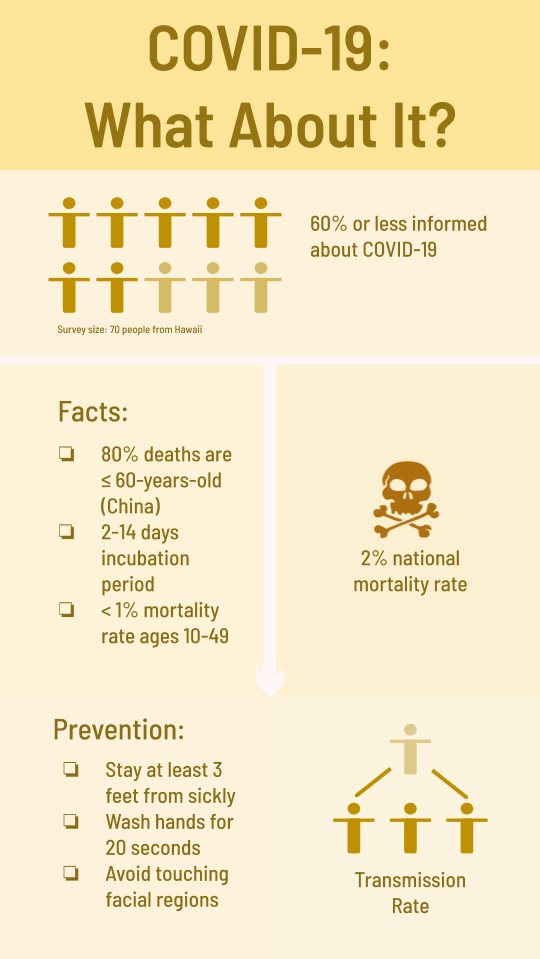COVID-19: Accurate info is essential
February 26, 2020
The Hawai’i Department of Health announced on March 8 that they are investigating a second case of Coronavirus or COVID-19 in the islands. This second case, according to local health officials, is a man who recently traveled to Washington. State officials announced precautionary measures and warmed that the Coronavirus may spread quickly through the community. According to the World Health Organization, more than 100,000 people have been infected and there have been 3,400 recorded deaths as of publication.
Coronaviruses are a large family of viruses that can make people sick with varying degrees of intensity. Symptoms can be mild, similar to those of the common cold, but can be more deadly and severe. The WHO warns that the elderly and those with preexisting health conditions could suffer Severe Acute Respiratory Syndrome and Middle East Respiratory System.
The new coronavirus hasn’t been identified in humans before so world health officials warn there is not yet a vaccine or cure.
On Dec. 31, 2019, China reported a “cluster of cases of pneumonia” in people associated with the Huanan Seafood Wholesale Market in Wuhan, Hubei Province, according to a report written by the WHO. On Jan. 7, WHO reported that Chinese health authorities confirmed this “cluster” was a novel coronavirus, 2019-nCoV. That is how officials determined the name: COVID_19.
The first infections were linked through live meat markets and some reports say that this strain of the virus is from the endangered pangolin.
The virus is now spreading from person to person and is highly contagious. When people cough and sneeze, the virus can spread to others. Recent reports also claim the virus can live on surfaces for up to three days.
Since it was first reported in China at the end of last year, the virus has spread to Italy, Iran, Europe and the United States. China took extreme measures to quarantine the virus and sent scientists to investigate local towns. Chinese scientists, in collaboration with WHO officials, have reported a total of 90,000 confirmed cases.
They also reported that 80% of people had moderate symptoms, 13.8% had severe symptoms and 6.1% had life-threatening symptoms.
As of now there are no vaccines or cure but there are ways to reduce the chances of getting infected. A recent survey conducted by Kalani Leo reporter Saara Nicole Chadwich showed that many people are still very confused about the nature of the virus.
One way to help stop the spread of the virus is to cover your mouth or nose when you sneeze. Another way is to wash your hands with soap and water for 20 seconds. Officials report that the best way to prevent COVID-19 from spreading is through social distancing.
Hawai’i and the world have yet to see the consequences of this WHO-declared pandemic.

Sources:



